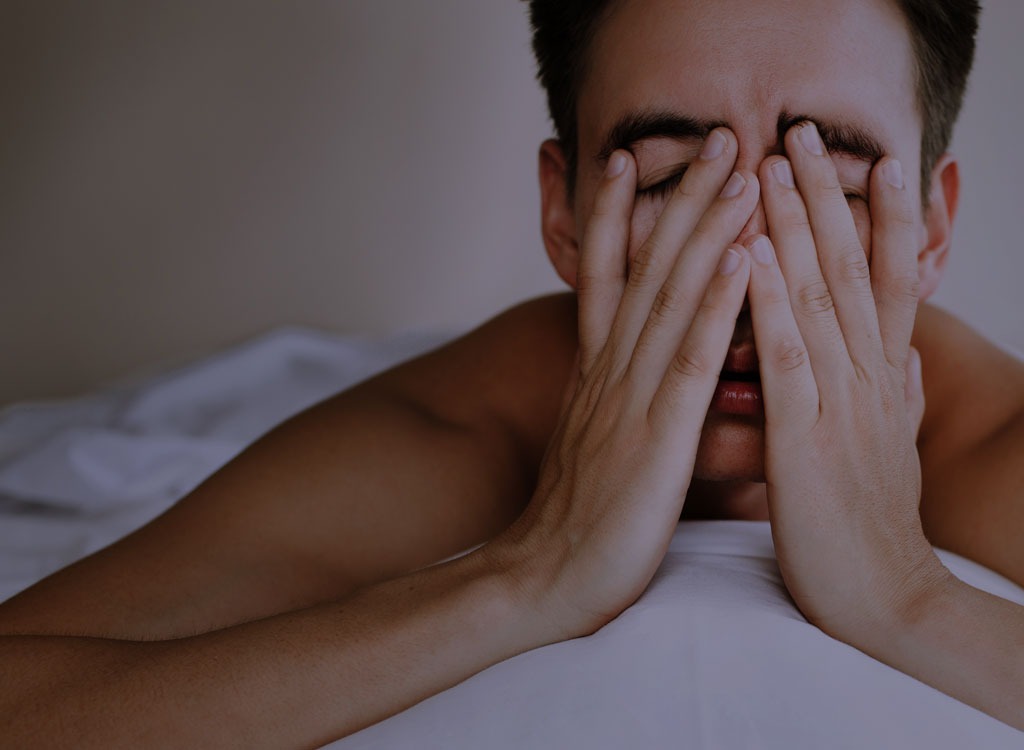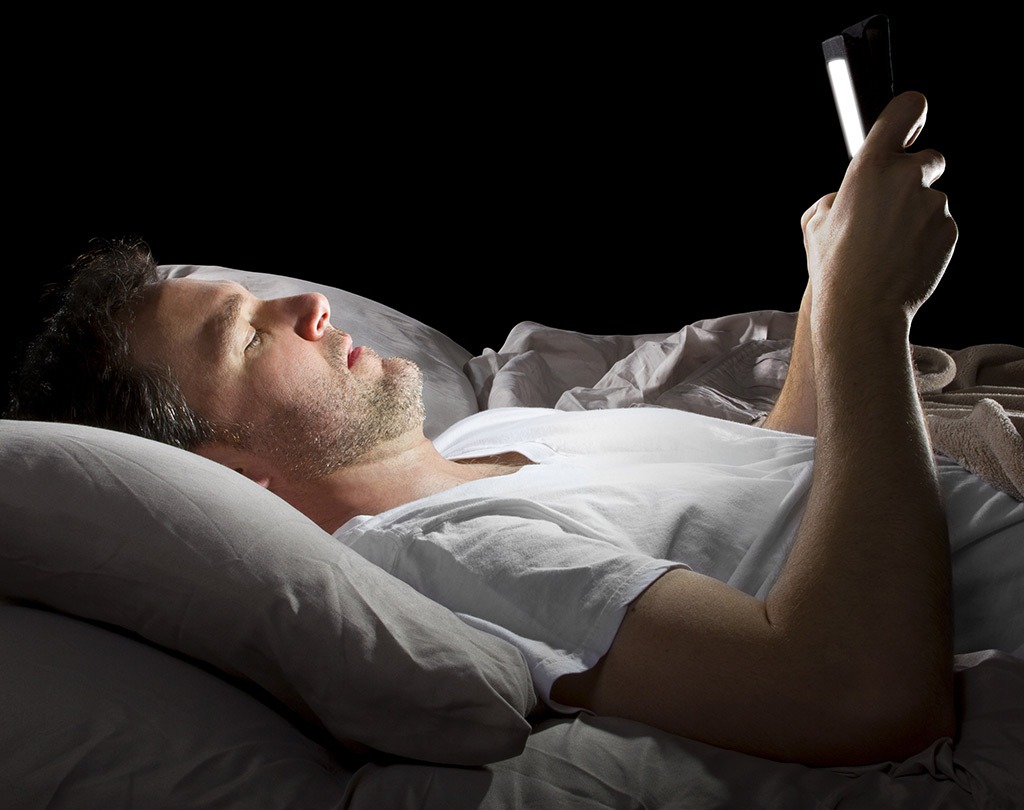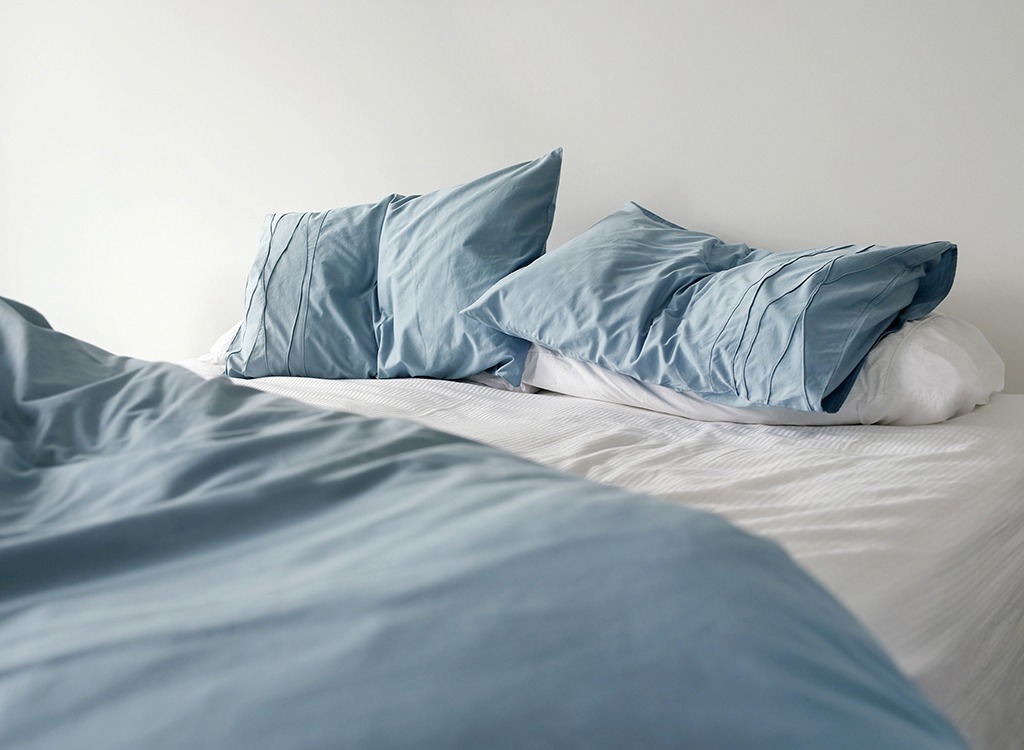7 Sleep Mistakes Everyone Makes—But Shouldn’t

Believe it or not, you can sleep your way to slimmer you. In fact, a recent study found that a below-average sleep could sabotage your flat-belly dreams as much as 55 percent! And weight loss isn’t the only benefit of getting a solid night of shut eye: Fitting in 7 to 8 hours of sleep a night can help to improve memory retention, reduce levels of inflammation, lower stress, boost immunity, and can even lower your risk of serious health issues such as heart disease.
Here’s the thing: many of us are partaking in sleep-sabotaging habits. And most of these habits are so common, we were shocked to find that even the simplest nighttime routines may be widening our waistlines and harming our health.
But don’t sweat it — Eat This, Not That! uncovered 7 common nighttime habits that you should kick to the curb to help you rest easy. If these sleep mistakes shock you, then you might want to check out these 20 Weird Reasons Why You’re Gaining Weight Fast, too.
You Stay Up Too Late

A few extra late-night hours may mean waking up to clean dishes or a finished work project, but research shows that the fewer hours you spend catching those Z’s, the worse it is for you. In fact, the less you sleep, the more you will crave high-calorie foods and your body’s levels of cortisol, the fat-storing hormone will increase. Isabel Smith, MS, RD, CDN and founder of Smith Nutrition explains that “When we don’t get enough sleep, our hunger hormones are greatly affected, (which can mess with your body’s ability to determine when it’s actually hungry, when it should stop burning calories, and when it should store energy as fat.)” Did you know you should be getting at least 6-8 hours of sleep each night? What’s more, you can even slim down while doing it! Check out these 20 Surprising Ways to Lose Weight In Your Sleep.
You Fall Asleep On The Couch

Admit it. We all love to do it. But before we make this a habit, consider this: by waking up in the middle of the night and trudging up to bed you’re disrupting your soothing and essential steady sleep hours. When you don’t get a consistent night’s sleep our bodies over-produce ghrelin the next day. This hunger-stimulating hormone increases feelings of hunger even when our bodies aren’t in need of food!
You Read From An IPad In Bed

Seriously, go you for reading and not binge-watching some Netflix! But, either way, you’re way better off picking up a book. Research conducted for the Zero Belly Diet showed that the more electronics we bring into the bedroom, the fatter we get. A study in the Pediatric Obesity journal found that millennials who lounge in the glow of a TV or computer can’t get enough rest and suffer from poor lifestyle habits. Even more, they found that the children with access to one electronic device were nearly 1.47 times as likely to be overweight compared to those with none.
You Keep Water On Your Nightstand

There’s a reason drinking water wasn’t placed on our list of 30 Things to Do Before Bed to Lose Weight. The reasoning is quite logical: if you drink too much before you’re fast asleep, you may end up waking up in the middle of the night to urinate. The Sleep Research Society announced that according to their research those who sleep too few hours (5-6) we’re prone to have an increased risk of weight gain and, even worse, fat gain.
You Snack In Bed

Not only does this lead to crumbs in your sheets (ew), but eating in bed can set you for a major diet debacle! Regardless of how “healthy” your late-night pick may be — if you go to bed completely full, your body has to work throughout the night to digest. It makes total sense, if your body is busy breaking things down, you won’t be able to fully recharge during those prime tranquil hours. The longer it takes your body to reach a peaceful state, the less rest you’ll get. You’ll wake up feeling unsteady and you’re more likely to pick a calorie-crammed item for breakfast.
You Like Your Room Nice and Warm

Unfortunately, it’s time to kiss goodbye the familiar warm and cozy sheets and say hello to a cold bedroom. It may not sound great at first, but this bedroom temperature is perfect for those looking to blast fat and fall asleep faster. According to a study in the Diabetes Journal, cold temperatures may help us attack belly fat while we sleep. Cool temperatures boost the power of our stores of brown fat — a type of metabolically-active fat that helps keep us warm by burning through fat stored in our bellies! Better still, sleeping a cold room helps you fall asleep faster and stay asleep. That’s because our body temperature naturally declines upon sundown and keeping the AC will help your body reach that lower, sleep-inducing temperature faster.
You Choose Chocolate for Dessert

We’re not saying dessert is no-go, but having chocolate can be causing you to count sheep more often than you’d like. While dark chocolate that’s 70 percent cacao may be one of our favorite sweets, it should be kept as a mid-day snack. The antioxidant-providing candy also contains caffeine, which can cause a bump in the road for your body on its way to winding down.